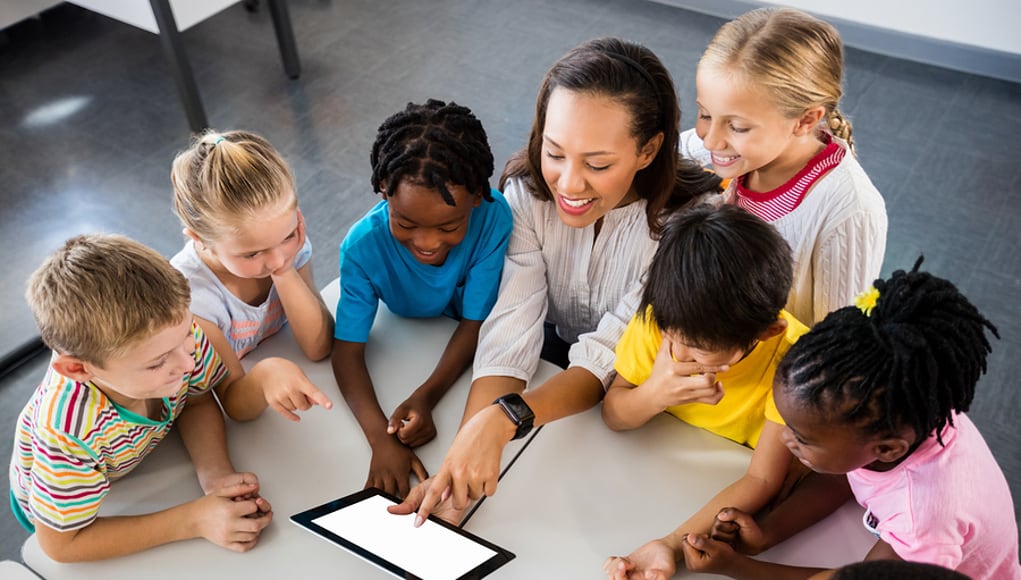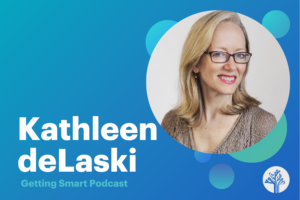To Bring Learning into the Digital Age, We Must Empower Teachers

By Bev Perdue
When you’re trying to find a restaurant in an unfamiliar city, do you pull out a folded-up map, or do you pull out your smart phone and Google it?
As technology evolves, our expectation for how that technology can and should make our lives better evolves with it. While holding a paper map may bring out a sense of nostalgia, we know inherently that our phones will help us to navigate to an unknown location more quickly and efficiently.
Yet every day, we ask teachers to prepare 50 million U.S. students for college and careers using a one-size-fits-all learning model that is tailored to the past. Under this model, teachers and schools are pressured to teach to compliance rather than competency, and our students leave school ill prepared for their own future.
- Less than 40 percent of graduating high school students score at college and career-ready levels.
- The U.S. faces a skills gap in which 6.9 million people are unemployed despite availability of 6 million jobs.
- Fourth- and eighth-graders in the United States have made little to no gains in math and reading since 2015.
Teachers know the current system is outdated, and they know technology can help provide an answer for better success. A 2016 survey of 1,327 teachers revealed that 85 percent “believe digital tools that provide immediate, ongoing information about student understanding will increase learning.” Unfortunately, most teachers also said they feel they lack the skills and knowledge they need to effectively incorporate digital tools and personalized learning practices in their classrooms.
To bring education into the digital age, we must give teachers the skills they need to adapt their classrooms. And teachers can’t do it alone – they need district and state leaders to invest in meaningful professional development opportunities that let them explore new teaching practices. That’s why digiLEARN, the nonprofit I co-founded that’s dedicated to increasing personalized learning options for students and expanding instructional opportunities for educators, has created two resources to empower teachers and schools to transform classrooms through technology.
The first is a new brief, Personalized Learning in a Digital World: Four Key Priorities for Digital and Personalized Learning, a guide for teachers and schools to learn best practices for incorporating technology and data into the classroom. This report, released publicly last week, highlights four key priorities for schools and school districts:
- defining personalized learning from the student’s perspective;
- developing the capacities of teachers to implement digital and personalized learning practices in their classrooms;
- creating high-quality digital content and innovative state assessment models that provide real-time feedback about students’ learning;
- and improving access to education through the strategic expansion of technology infrastructure and highspeed broadband access.
The brief includes real-world examples for each priority, showcasing how schools and districts can successfully implement them.
The second resource is our Digital Scholars Initiative, currently in its pilot phase in North Carolina with plans for expansion across the country. Through the Digital Scholars Initiative, teachers become leaders in their districts by using their classrooms as learning labs, teaching others to incorporate digital and personalized learning practices into their own classrooms. Scholars also work with entrepreneurs to design innovative new learning tools.
Much like a paper map, our current educational system is outdated. Luckily, there are forward-thinking teachers and schools who want to use technology to transform their classrooms into collaborative, creative spaces where teachers become guides (an in-person Google, if you will) who help students drive their own learning.
For more, see:
- Show What You Know: The Shift to Competency
- Cookie Cutters and False Expectations
- Personalized Learning Experiences: Why? And How?
Former North Carolina governor Bev Perdue is the co-founder and board chair of digiLEARN. Connect with them on twitter: @DigiLearnInst
Stay in-the-know with all things EdTech and innovations in learning by signing up to receive our weekly newsletter, Smart Update.






0 Comments
Leave a Comment
Your email address will not be published. All fields are required.